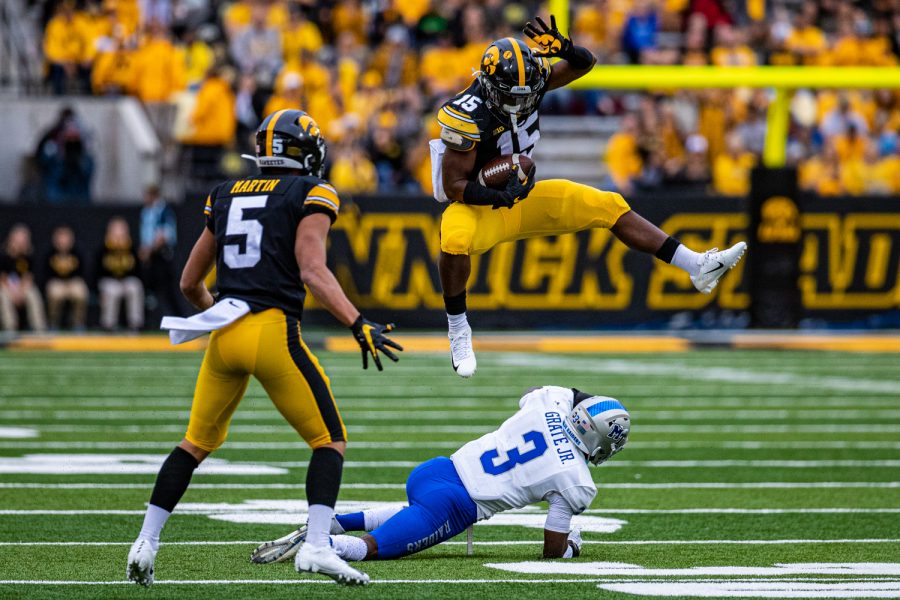New Big Ten football schedule structured to ‘maximize flexibility’
Games can be collapsed into bye weeks if teams cannot play at a scheduled date.
Iowa running back Tyler Goodson hurdles MTSU’s Gregory Grate, Jr. during a football game between Iowa and Middle Tennessee State at Kinnick Stadium on Saturday, September 28, 2019.
August 5, 2020
The Big Ten released its new 10-game, conference-only football schedule Wednesday morning, which is structured to “maximize flexibility.”
All 14 Big Ten teams will play their nine original 2020 Big Ten opponents, as well as one additional cross-division game. The schedule starts as early as the weekend of Sept. 5 with final games slated for Nov. 21 to align with academic calendars.
The 10 games are set to be played over at least 12 weeks with each team having two open dates.
The football schedule starts as early as the weekend of Sept. 5 with final games slated for Nov. 21 to align with academic calendars. The Big Ten Football Championship Game remains scheduled for Dec. 5 at Lucas Oil Stadium, though it could be moved as late as Dec. 19. pic.twitter.com/vWp3OSifBc
— Big Ten Conference (@bigten) August 5, 2020
Other features built into the new schedule:
- Games can be collapsed into bye weeks.
- Uniform bye week on Nov. 28.
- Cross-division games are currently scheduled for all schools in Week 1 (Sept. 5) and Week 12 (Nov. 21).
- Schedule constructed in a way that allows season to start as early as Sept. 5, but also provides the ability to move the start of the season back to Sept. 12, 19, or 26 through strategic sequencing that allows games to be moved to a latter part of the schedule.
The Big Ten Football Championship Game remains scheduled for Dec. 5 at Lucas Oil Stadium in Indianapolis, though it could be moved to as late as Dec. 19.
The Iowa football team opens its season at home Sept. 5 against Maryland as part of the new schedule.
The B1G SZN | #Hawkeyes pic.twitter.com/Eh7JcEZDnn
— Hawkeye Football (@HawkeyeFootball) August 5, 2020
The Hawkeyes play four crossover games with the Big Ten East Division — Maryland, Penn State, Michigan State, and Ohio State. The game against the Buckeyes on Nov. 21 will mark the end of the regular season for the Hawkeyes.
Iowa’s bye weeks are scheduled for Oct. 17 and Nov. 7.
RELATED: Iowa football opens season at home Sept. 5 against Maryland as part of updated Big Ten schedule
“As a program, we have been looking forward to this day since the decision to play a conference-only schedule was announced,” Iowa head football coach Kirk Ferentz said in a release. “Knowing when our games are scheduled will allow us to prepare for what is ahead on the field and support our players’ academic schedules off the field.
“Our players have shown patience and dedication during the most recent period of conditioning and off-season workouts, and now we are excited to begin the process of preparing for a football season. We are continuing to closely monitor the health and safety of our players and staff and look forward to starting our season in Kinnick Stadium on Sept. 5.”
Teams can begin preseason practices on Friday.
In addition to the updated football schedule, the Big Ten announced Wednesday that competition start dates for other fall sports have been postponed through at least Sept. 5. Conference-only schedules for these sports will be released at a later date.
The Big Ten announced July 9 that it was moving to conference-only schedules in fall sports for 2020 due to concerns with COVID-19.
By limiting competition to only other Big Ten schools, the conference said in a statement that it will have the “greatest flexibility to adjust its own operations throughout the season and make quick decisions in real-time based on the most current evolving medical advice and the fluid nature of the pandemic.”
The conference made it clear when releasing its football schedule Wednesday that this announcement does not ensure that a season will take place.
“While our strategy is to continue planning for all fall sports, if the virus continues to spread among our students despite our many preventative measures, including testing and quarantine protocols, we are also prepared to delay or cancel competition pursuant to local and state public health orders or the recommendations of our medical experts,” The Big Ten said in a release.
“As Commissioner Kevin Warren has consistently stated, our country is navigating unprecedented times and throughout all decisions, the health and safety of our students, student-athletes, and everyone associated with our Big Ten university communities remains our primary focus as we work with our institutions to provide a healthy and productive learning environment that includes intercollegiate athletic competition.”



